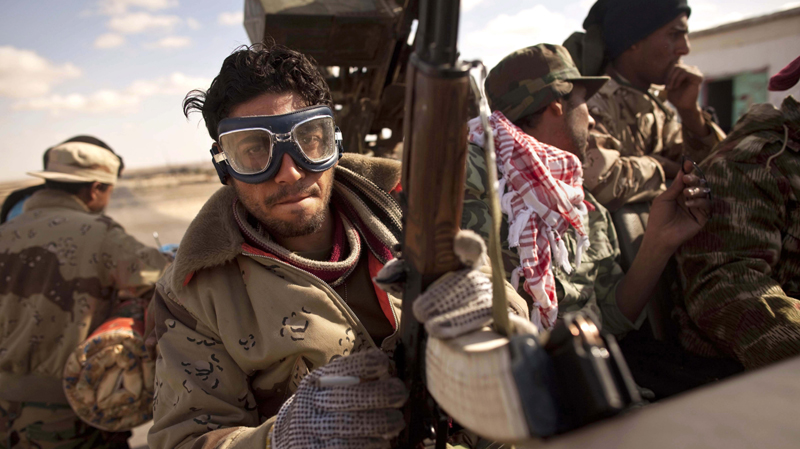
Russia Placing Itself Above the Fray in Libya
Publication: Eurasia Daily Monitor Volume: 8 Issue: 83
By:

Russia has signaled that it can leverage its veto in the UN Security Council to entrap NATO in a protracted conflict in Libya. On April 26, Foreign Affairs Minister, Sergei Lavrov, told the media that Russia would not support a new Security Council resolution, if this leads to further escalation of the civil war and further interference from the outside in Libya. However, Moscow would support a resolution calling for an immediate ceasefire, a stop to all violence, and for the two Libyan sides to start negotiations immediately (Interfax, April 26).
Thus, Russia would veto a Security Council authorization for NATO/US military assistance to the rebels or intervention on the ground. However, Moscow would approve gelling the stalemate, negotiations with Colonel Muammar Gaddafi’s government (and with Gaddafi himself, at least initially), and de facto partition of Libya along ceasefire lines. Western belligerents will face this outcome unless they win the war quickly by committing massive force, rather than allowing Moscow to veto NATO’s own decisions.
President Dmitry Medvedev has accepted Greece’s proposal (almost certainly inspired by Moscow itself) for Russia to offer “mediation assistance” in the crisis (EDM, April 26). Moscow has also opened a communication channel with Tripoli at the public level. Following Lavrov’s officially reported telephone conversation with Libyan Prime Minister, Baghdadi al-Mahmudi, Russia Today state-owned TV interviewed Libyan government spokesman Musa Ibrahim. Welcoming Moscow’s statements, Ibrahim requested Russia to convene an extraordinary meeting of the UN Security Council to discuss NATO bombing of Libyan civilian sites and attempts to kill Colonel Gaddafi. Tripoli also wants Russia to send observers to Libya for fact-finding and coordination with BRICS countries (Interfax, Al-Jamahiriyah TV, April 26).
Russia is giving the Western belligerents some slack for now, while positioning itself as a possible arbiter. Deputy Minister Gennadi Gatilov has replied that a Security Council meeting is not foreseen, and Russia does not intend to send observers to Libya at this time (Itar-Tass, April 28). Meanwhile, Moscow is building up its arbiter’s credentials on a daily basis through equidistant diplomatic statements and attempts to seize a high moral ground.
Moscow’s theses are: 1) Both sides are firing indiscriminately, killing innocent Libyan people every day. 2) NATO aviation strikes both military objects and civilian infrastructure, in Tripoli and other cities; the US and NATO have taken sides in an internal Libyan conflict. 3) both the use of military force against unarmed protesters, and intervention from outside for regime-change, are unacceptable. 4) The air strikes, as well as taking sides in the civil war, are incompatible with UN Security Council Resolution 1973. 5) NATO and the US ought to observe the terms of that resolution, call a ceasefire, and promote inter-Libyan dialogue, with external support but without external interference (www.mid.ru, Interfax, April 26 – 29).
Prime Minister, Vladimir Putin, insists that the air strikes on Libya are killing people and destroying civilian infrastructure, while the attempts to kill Gaddafi are illegal. “As I see it, we should act responsibly, with consideration for civilians. However, the so-called civilized community attacks a small country and destroys its infrastructure,” Putin admonishes (www.premier.gov.ru, Interfax, April 26, 27).
Russia made the US/NATO military intervention in Libya possible in the first place, by abstaining in the UN Security council vote on resolution 1973, rather than vetoing it. Russia’s March 27 abstention was a diplomatic masterstroke, poorly understood at that point by the Obama administration, which credited its “reset” for the Russian green light. As Konstantin Kosachev, chairman of the Duma’s International Affairs Committee, spelled it out: By abstaining, Russia has positioned itself to demand full observance of the resolution’s provisions by those who voted for it, and without sharing responsibility with those countries for the political consequences of their intervention (EDM, April 25).
As it turns out, the Western belligerents have undertaken this operation with insufficient forces; the US has withdrawn its most effective strike planes prematurely from action; and NATO — to which the US has largely devolved the operation — fights with one hand tied behind its back, unable to reinforce and escalate as long as Russia does not approve this via the UN Security Council, or by some tacit arrangement.
Arming the rebels is a poor option because it would simply prolong the conflict without a decisive outcome, absent of a massive US/NATO offensive. The top rebel commander, General Abdel Fattah Yunis, has rushed to Brussels, with a shopping list of weapons for insurgent forces that are yet to be trained. “We don’t mean light arms,” Yunis clarified for the press in Brussels. He wants Apache helicopters, anti-tank missiles, and torpedo boats for the rebel forces. “NATO has everything,” he judged (Interfax, April 28).
Russia will not necessarily or permanently veto a massive US/NATO offensive. Moscow will almost certainly negotiate its position, seeking trade-offs on issues of priority interest to Russia. For the time being, it can de facto tolerate an incremental escalation of offensive operations, insufficient for Western belligerents to win quickly, but sufficient to entangle them in yet another protracted conflict. If this scenario materializes, Moscow plans to emerge in some mediator’s role above the fray. And irrespective of the tempo of military operations, Russia is set to collect a windfall on European oil and gas markets, due to the halt in Libyan supplies for an indefinite period.




